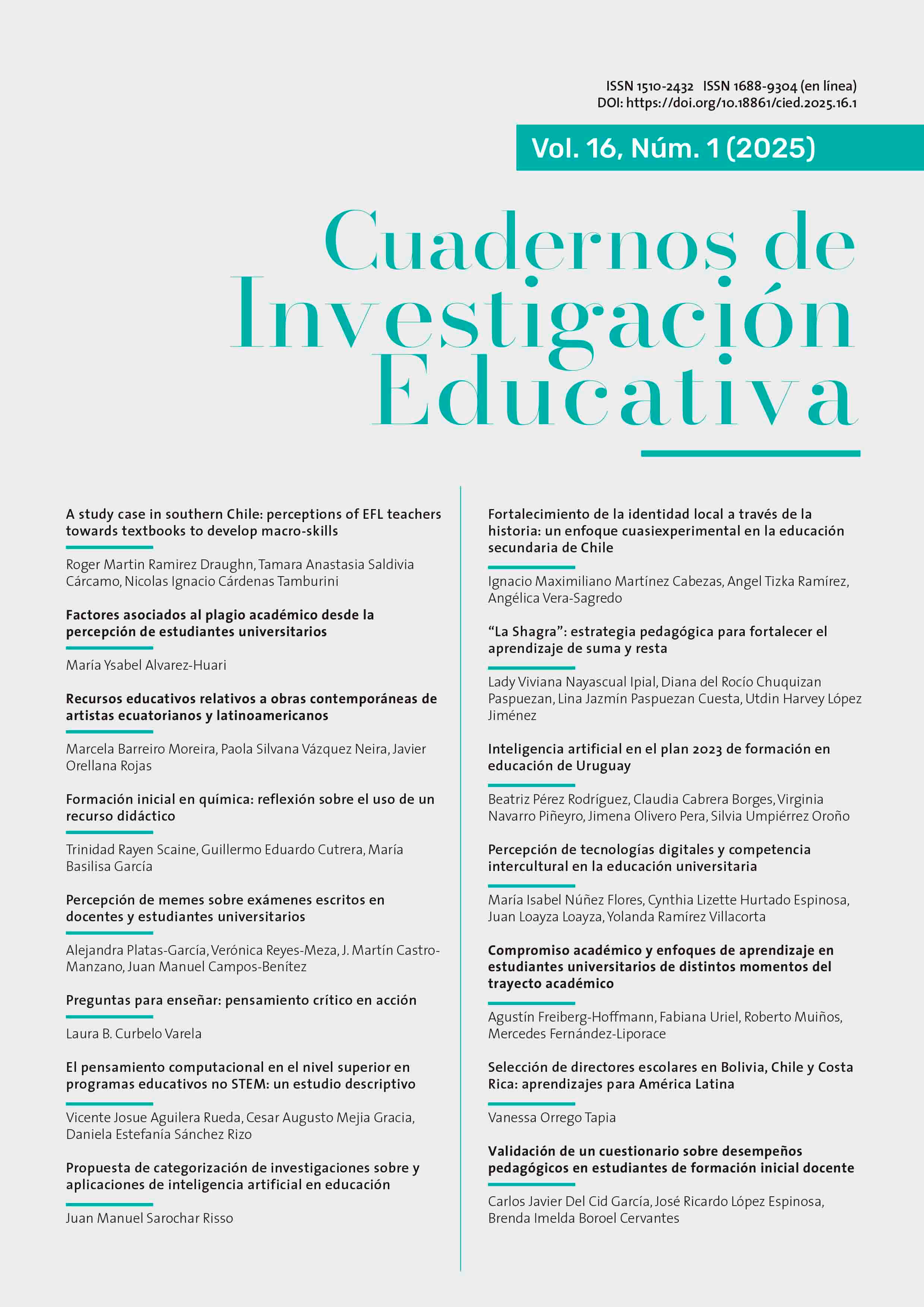Questions to teach: critical thinking in action
DOI:
https://doi.org/10.18861/cied.2025.16.1.3908Keywords:
pedagogical question, critical thinking, teacher training, critical pedagogyAbstract
This paper arises from academic research in which the relationship between educational practices and the development of critical thinking is studied, focusing on the pedagogical teaching question as a fundamental element to promote the latter's growth in the training of elementary school teachers. The question drives curiosity and orients the search and inquiry toward what one wishes to know. Teaching and learning begin with questions, so formulating good questions produces an epistemic turn in teaching practices. For this research, teachers in teacher training in the metropolitan area of Montevideo (Uruguay) were taken as the unit of analysis. A critical base design was carried out with a non-probabilistic and intentional sample of heterogeneous character within this population universe. The data collection tools used for the qualitative methodology were a documentary survey, semi-structured interviews, in-depth interviews, and participant observation. The analysis strategy was grounded theory, which determined that in most cases the practices of teacher educators are framed in a paradigmatic logic of explanation, which involves and strengthens the conception of the student as a minor and the teacher as a sage, thus moving away from the essential marks of a critical paradigm. The research concludes that questioning unfolds as a poorly planned teaching exercise and with the scarce presence of authentic/honest questions; in fact, it was detected that there is a mismatch between the paradigms that trainers theoretically sustain and to which they claim to be affiliated or subscribed and the practice in relation to the questions they ask.
Downloads
References
Anijovich, R., & Gvirtz, S. (2009). Estrategias de enseñanza, otra mirada al quehacer en el aula. Aique Grupo Editor.
Baquero, R. (2001). La educabilidad bajo sospecha. Cuadernos de Pedagogía, 9, 71–85.
Dewey, J. (1989). Cómo pensamos. Nueva exposición de la relación entre pensamiento reflexivo y proceso educativo. Paidós.
Elder, L., & Paul, R. (2006). The Art of Asking Essential Questions. Based en Critical Thinking Concepts and Socratic Principles. www.criticalthinking.org
Elías, N. (1994). Conocimiento y Poder. Ediciones de la Piqueta.
Fisher, A. (2001). Critical thinking: an introduction. Cambridge University Press.
Fisher, A. (2021). What Critical Thinkig is? En A. Blair (Ed.), Studies in Critical Thinking (2.nd ed.). Windsor Studies in Argumentation.
Freire, P., & Faúndez, A. (2010). Por una pedagogía de la pregunta: crítica a una educación basada en respuestas a preguntas inexistentes. Siglo XXI Editores.
Guelman, A., & Palumbo, M. M. (2019). La construcción de pedagogías descolonizadoras: notas desde la praxis del trabajo en organizaciones sociales. Revista Colombiana de Educación, 1(76), 33–49.
Larrivee, B. (2008). Development of a tool to assess teachers’ level of reflective practice. Reflective Practice, 9(3), 341–360. https://doi.org/10.1080/14623940802207451
Lipman, M. (1998). Pensamiento complejo y educación. Ediciones de La Torre.
Lipman, M., Sharp, A. M., & Oscanyan, F. S. (1992). La filosofía en el aula Ediciones de la Torre.
Masschelein, J., & Simons, M. (2014). Defensa de la Escuela. Una cuestión pública. Miño y Dávila.
Morin, E. (1999). La Tête bien faite. Repenser la réforme, réformer la pensée. SEUIL.
Rancière, J. (2003). El maestro ignorante: cinco lecciones sobre la emancipación intelectual. Editorial Laertes.
Southwell, M. (2020). Posiciones docentes: interpelaciones sobre la escuela y lo justo. Biblioteca Devenir Docente.
Vasilachis de Gialdino, I. (2006). Estrategias de investigación cualitativa. Gedisa Editorial.
Walsh, C. (2017). Pedagogías Decoloniales. Convergencias y divergencias: Prácticas insurgentes de resistir, (re)existir y (re)vivir. Ediciones Abya-Yala.






